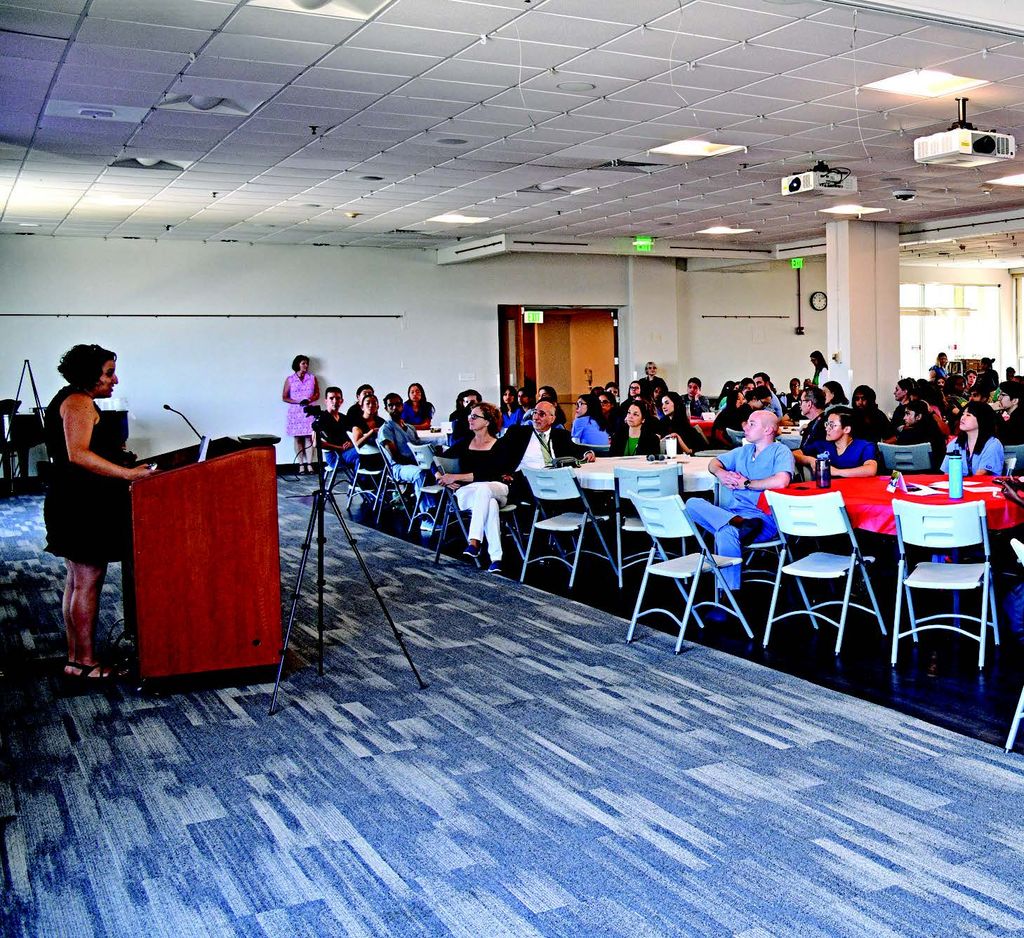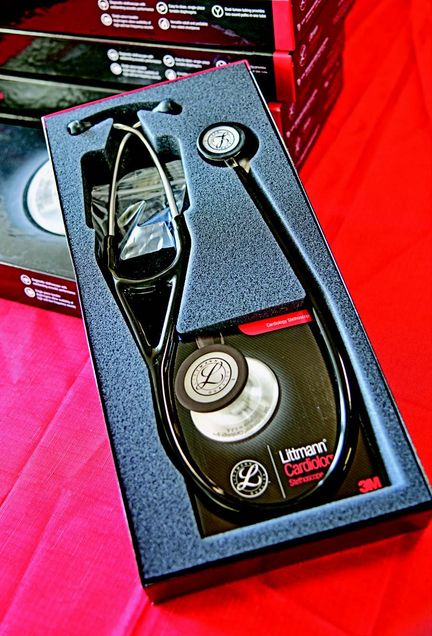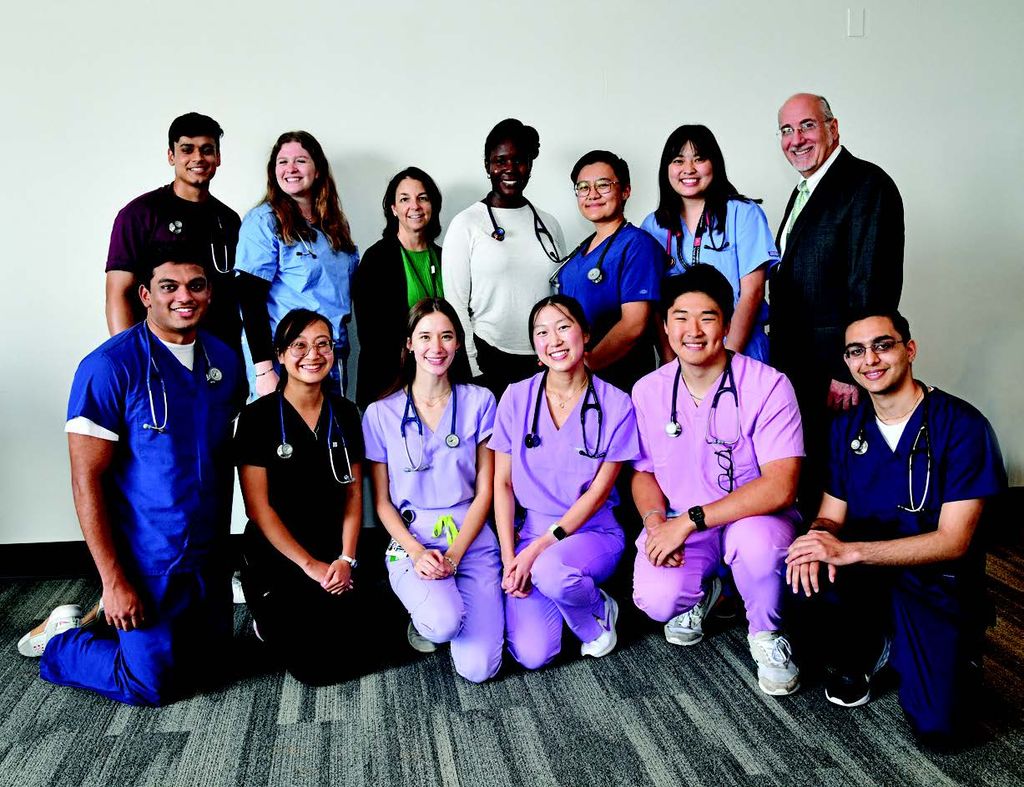Sixth Annual Stanfield Lecture Emphasizes Importance of Doctor-Patient Relationship
The stethoscope draped around her neck meant a lot to first-year medical student Rohini Kambhampati as she posed for a photo with classmates at the sixth Annual Lorraine Stanfield, MD, Memorial Doctoring Lecture, held on August 28. The lecture aims to help new students understand the healing role of patient-physician interactions, especially how the physical examination contributes to diagnosing and caring for patients.
“I feel like I’m finally entering the field that I’ve always wanted to enter,” said Kambhampati, whose family emigrated from India. Her father is a Houston-based physician.
It’s become a tradition for first-year medical students to receive the tools of their profession— a stethoscope donated by alumni, a patella hammer, and the tuning forks, an ophthalmoscope and an otoscope—following the Stanfield Lecture.
In the keynote lecture, Stephen Tringale (CAMED’90), an assistant professor of family medicine, told the 175th entering class that the doctor-patient relationship is one of the most important healing tools they will have.
“When I walk into the [examination] room, I think in my head that I’m shoulder to shoulder with the patient, that I’m on the same side of the table,” said Tringale, who also serves as the Codman Square Health Center medical director for quality and patient safety, performance improvement & research. He is a resident and student preceptor and a family physician.
A key principle guiding his patient interactions is how he can help them. Medicine involves continuous learning, and ideally, a doctor experiences tremendous personal and professional growth during a medical education and throughout a career. The doctor- patient relationship is, at its core, a selfless experience in which knowledge is partnered with the human relationship shared by a doctor and patient.
“We are meeting the patient where they are, not where we are,” Tringale stressed. “Understand why you want to be a doctor, and this will sustain you through the tests, the down times, and the difficult relationships. It will sustain you through the hardships that you will be present for and bearing witness to. It will be your North Star, your compass,” he said.
Stanfield, who died in 2017 from breast cancer at age 56, spent two decades taking care of medically underserved patients at Dorchester House Health Center (now known as DotHouse Health) as a primary care provider. She was one of the first physicians involved in the Center for Community Health, Education & Research program, which offered medical students longitudinal experience at a community health center, and for 25 years she strove to eliminate racial and ethnic disparities in healthcare through the education of health professionals and by improving services to underserved populations.
 Assistant Dean of Medical Education for Curriculum Molly Cohen-Osher, MD, addresses students gathered for the Stanfield Lecture.
Assistant Dean of Medical Education for Curriculum Molly Cohen-Osher, MD, addresses students gathered for the Stanfield Lecture.
“The qualities that people use to describe Dr. Stanfield
are the qualities we want you to take away from your time here and bring into your future practice.”
Stanfield was intellectually curious and made a point of knowing and understanding her patients in the context of their communities. “Lorraine coached people to listen,” said Michelle Nadow, chief executive officer at DotHouse Health. Nadow urged students to venture beyond the four walls of the hospital or medical practice and into the neighborhoods.
Molly Cohen-Osher, MD, assistant dean of medical education for curriculum and instructional design and assistant professor of family medicine, recalled Stanfield ensuring a supportive space for her when she joined BU a decade ago as a junior faculty member and new mother.
“She set an example for me of the type of clinician-educator and faculty mentor I wanted to become,” said Cohen-Osher. “The qualities that people use to describe Dr. Stanfield are the qualities we want you to take away from your time here and bring into your future practice.”
 The stethoscope medical students receive.
The stethoscope medical students receive.
 A group of first-year medical students pose for a photo with keynote speaker Stephen Tringale after the lecture.
A group of first-year medical students pose for a photo with keynote speaker Stephen Tringale after the lecture.